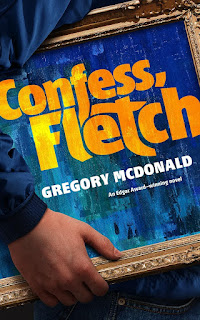Many readers of this site are probably familiar with the character Irwin Maurice Fletcher, or Fletch to his friends, from having seen two Chevy Chase movies in the ’80s, or perhaps from watching last year’s Confess, Fletch, a comedy-drama starring Jon Hamm in the titular role that is currently streaming on television.
All three movies are fun, and Hamm isn’t bad casting for the character, but none of the films comes close to capturing the lyrical genius of the Fletch novels written by the late Gregory Mcdonald. If you’re a mystery fan, you owe it to yourself to pick up
 one of these books, arguably the smoothest, fastest, and most delightful whodunits ever written.
one of these books, arguably the smoothest, fastest, and most delightful whodunits ever written.As with any great crime series, you can read the Fletch novels as standalones in whatever order you wish. The first one, Fletch (1974), and its sequel, Confess, Fletch (1976), both picked up Edgar Awards (for best first novel and best paperback original, respectively)—back-to-back wins that stand unmatched.
Sometimes a movie can amplify reader interest in a book, but when a movie gets mass distribution and is produced after a series has ended, often the source material is eclipsed in the public consciousness. In the case of Mcdonald, all the Fletch books are still in print, so here’s hoping the renewed film interest will put them back in a place of prominence on bookstore shelves.
Plotted with the precision of a Sherlock Holmes puzzle and written with the commanding cool of an Elmore Leonard heist, the Fletch stories almost seem effortless to the reader, but are a masterclass in plotting, pacing, and dialogue.
Recently I reread Confess, Fletch because that second novel finds Fletch, formerly an investigative journalist, moving up in the world and working as an art critic. I had finished writing a novel of my own about art theft, forgery, and museum heists, and knowing I’d be asked about art mysteries when my book hit the shelves this year, I decided to read and reread any novels dealing with the art world. (A big topic we’ll save for another column.) Though I’d read all the Fletch novels before, after one chapter into Confess, Fletch, I was once again stunned by the speed at which the story unfolds.
There are a handful of writers who turn dialogue into action, using any verbal exchange between characters to bring tension and movement to a plot, as if the conversation was a car chase or tug-of-war. Authors such as Elmore Leonard, Ross Thomas, Joe R. Lansdale, and Loren D. Estleman are deservedly admired for packing personality into every set of quotation marks.
Nobody writes dialogue better than Gregory Mcdonald, though. Somehow he manages to carry entire chapters with unattributed dialogue, the normal “Fletch said” or “she said” tags unnecessary because the back-and-forth is so tight.
In the very first chapter of this second novel, Fletch discovers a dead body in the living room of his apartment, and after placing the compulsory call to the police (which doesn’t go as you’d expect), the story takes off like a rocket. In less than 20 pages, Mcdonald introduces no fewer than five characters, including the inscrutable Inspector Francis Xavier Flynn, an Irish cop as sharp and eloquent as his prime suspect, Fletch. Although physical descriptions are minimal, the prose is so pointed, you easily visualize each character, and the banter carries a subtext that simultaneously makes you smile even as you begin to fear for the safety of your protagonist.
These books are fast, fun, and full of surprises sufficient to keep any mystery maven guessing. The writing is so clean it’s almost too easy to take the craft for granted, but the genius of Gregory Mcdonald should never be forgotten.
READ MORE: “A Final Farewell to Fletch’s Father,” by Cameron Hughes (The Rap Sheet).

















1 comment:
While I find the Fletch novels more uneven than you might, FLETCH and CONFESS, FLETCH--which latter not so incidentally introduces the police investigator Flynn, who consistently though not dogmatically demands Fletch confess (at first)--are indeed all you say, and some of the sequels are, as well (Flynn also had his own briefer novel sequence). However, CARIOCA FLETCH and FLETCH AND THE WIDOW BRADLEY would Not be recommended starting points, I'd suggest, while the late Origins-of-Fletch novels FLETCH WON and FLETCH, TOO struck me as nearly as good as the first two novels, and SON OF FLETCH struck me as a worthy very late entry. And FLETCH AND THE MAN WHO was another solid entry...some very good reading awaits those who haven't dipped in.
Post a Comment